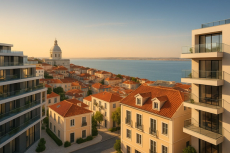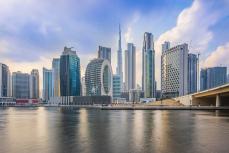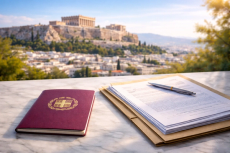Blog • Published on:June 9, 2025 | Updated on:June 9, 2025 • 11 Min
Where to Buy Real Estate Without Paying Annual Property Tax
In most countries, owning property means paying taxes on it every year, sometimes thousands of dollars, indefinitely. But that’s not the case everywhere. A few nations have no annual property tax at all, which can make a serious difference for investors, retirees, or anyone building long-term wealth through real estate.
These countries don’t skip taxes by accident. Many have structured their economies around other income sources, like oil, tourism, or financial services, so they can afford to drop recurring property taxes. It’s a calculated move, and it often attracts foreign buyers looking to reduce holding costs.
Over time, that difference adds up. A home that costs $10,000 a year in property tax elsewhere might cost $0 in a tax-free jurisdiction. That’s not just savings, it’s more freedom, fewer obligations, and a clearer long-term return.
In this guide, we’ll explore where those countries are, why they’ve chosen this model, and how to invest there, without the usual tax baggage.
Understanding Property Tax-Free Countries
What does “no property tax” really mean?
When a country has no property tax, it means you won’t pay a recurring fee to the government just for owning real estate. That’s different from transaction taxes (like stamp duty) or one-time registration fees, which might still apply when you buy the property. But once the deal is done, you’re not billed every year based on your home’s value.
In contrast, many countries charge annual property taxes that can range from 0.1% to over 2% of a property’s assessed value. Over time, that adds up, especially in places with high property appreciation or if you own multiple units.
Why do some countries skip property taxes?
There are usually two reasons:
- Alternative revenue sources: Countries like the UAE and Qatar rely heavily on oil exports or sovereign wealth funds. Tourism-heavy economies like the Bahamas or Dominica charge indirect taxes (like VAT or licensing fees) instead of taxing homeowners annually.
- Foreign investment strategy: Dropping property tax is a deliberate tactic to attract capital. Governments know that foreign buyers prefer predictable, low-maintenance costs, so no annual property tax makes their real estate market more appealing.
Is “no property tax” always better?
It depends on your goals. If you’re a long-term investor or a buyer who wants to avoid surprise costs, yes, it’s a major advantage. But you’ll still need to account for other potential expenses: maintenance fees, utility costs, and in some places, higher purchase taxes or community charges.
Still, the absence of a recurring tax bill offers a cleaner, more predictable ownership experience, especially for buyers with international property portfolios.
Top Countries Without Property Tax
United Arab Emirates (UAE)
The UAE charges no annual property tax. You might pay a one-time fee at the time of purchase (typically 4% in Dubai), but after that, you’re free from recurring government levies on your property.
- Key cities: Dubai, Abu Dhabi
- Popular property types: Luxury apartments, villas, branded residences, off-plan developments
- Other costs: Service charges for building maintenance (especially in high-rise properties)
The UAE’s zero-tax status extends to income and capital gains as well, making it especially attractive for business owners and digital nomads looking to relocate.
Read all about Dubai taxation, corporate and personal tax rates, and planning tips in our latest blog: Dubai Tax Rate Guide
Monaco
Monaco doesn’t charge property tax or capital gains tax. That’s one reason it has some of the most expensive real estate per square meter in the world.
- Key areas: Monte Carlo, La Condamine
- Popular property types: High-end apartments, waterfront penthouses
- Other costs: High cost of living, limited availability, intense buyer competition
This is a market where scarcity drives prices. Owning here is less about yield and more about wealth preservation.
Cayman Islands
No property tax, no capital gains tax, and no annual income tax make the Cayman Islands a go-to location for offshore investors and wealthy retirees.
- Key areas: Grand Cayman (Seven Mile Beach), Cayman Brac
- Popular property types: Beachfront condos, private villas, resort properties
- Other costs: One-time stamp duty (7.5%) on property purchases
It’s a well-regulated, English-speaking jurisdiction that offers full foreign ownership and legal transparency.
Dominica
Dominica has zero property tax and offers citizenship by investment through real estate. That means you can buy a government-approved property and apply for a second passport at the same time.
- Key areas: Roseau, Cabrits, jungle resorts
- Popular property types: Government-approved hotel shares, eco-resorts
- Other costs: Government fees tied to citizenship program, but no annual property tax
It’s a niche market, but for citizenship-seekers, it’s efficient and relatively low-cost.
Bahamas
The Bahamas waives property tax on owner-occupied properties under $250,000. Above that, tiered taxes apply, but if you don’t live there year-round or use the home as a second residence, many properties are effectively tax-free in practice.
- Key areas: Nassau, Paradise Island, Exumas
- Popular property types: Vacation villas, marina condos
- Other costs: Stamp duty and legal fees at purchase
The Bahamas also offers permanent residency through real estate investment, adding another incentive for buyers.
Qatar
Like its Gulf neighbours, Qatar charges no annual property tax. Foreigners can buy in designated areas and enjoy full ownership rights.
- Key areas: The Pearl, Lusail, West Bay
- Popular property types: Seafront apartments, luxury towers
- Other costs: Registration fees (usually 0.25% of purchase price), plus community service charges
Qatar is also working to expand its residency offerings tied to real estate investment, especially as it continues large-scale development post-World Cup.
Benefits of Investing in Tax-Free Real Estate
When you remove annual property tax from the equation, the financial dynamics of real estate shift. Below are the three most tangible advantages that investors gain when purchasing property in tax-free jurisdictions.
Financial Advantages
Lower carrying costs
Without property tax, annual expenses drop significantly. On a $1 million property, even a modest 1% tax elsewhere means $10,000 saved every year. That’s $100,000 over a decade, money that stays in your pocket.
Higher net rental yields
In rental markets, property tax often eats into landlord profits. In tax-free zones, you retain more income, which makes short-term and long-term rentals more financially efficient.
Fewer hidden costs
No annual government levies means fewer line items on your ownership statements, leading to more predictable cash flow and fewer surprises.
Owning a $500K property in a tax-free country can save you up to $50,000 over a decade in taxes alone.
Long-Term Investment Benefits
Compounding savings
The money saved from avoiding property tax can be reinvested or used for maintenance, upgrades, or acquiring additional properties. This builds wealth faster than in taxed environments.
Attractive resale potential
Buyers in high-net-worth segments often look for properties with low running costs. A property with no tax burden is easier to market, especially to offshore investors.
Portfolio-friendly for global buyers
Investors managing international portfolios benefit from countries with simpler, more transparent cost structures. Tax-free real estate fits well into a strategy focused on liquidity and diversification.
Wealth Preservation Opportunities
Ideal for asset protection
Tax-free jurisdictions often align with strong privacy laws, making them suitable for those using real estate as a vehicle for wealth protection.
Better estate planning
No annual taxes mean fewer ongoing liabilities to pass on to heirs. Some countries even waive inheritance taxes, making it easier to transfer assets across generations.
Currency diversification
Real estate in countries like the UAE or Cayman Islands often operates in USD or other stable currencies, helping you hedge against volatility in your home country.
Real Estate Investment Options in Tax-Free Nations
Property tax-free countries aren’t just low-cost, they’re also diverse. From luxury beachfront homes to commercial developments, here’s what’s typically available to investors across these jurisdictions.
Residential Properties
What’s available
Apartments, villas, townhouses, and gated communities, often in urban or coastal locations. In places like Dubai or Nassau, high-end properties come with concierge services, smart home integration, and full ownership rights for foreigners.
Why it matters
Residential properties are often the easiest entry point for individual investors or families. They also tend to qualify for residency or citizenship programs in countries like Dominica or the Bahamas.
Example:
A 2-bedroom apartment in Dubai Marina (UAE) might cost around $500,000, with zero annual tax and potential for long-term appreciation plus rental income.
Commercial Real Estate
What’s available
Office spaces, retail shops, warehouses, and coworking buildings. In places like Qatar and the UAE, entire free zones are structured to support commercial real estate investment.
Why it matters
Commercial real estate can generate stable rental returns and often comes with longer lease agreements. It’s especially appealing for investors who want passive income or to house their own business operations tax-free.
Example:
A small retail unit in The Pearl (Qatar) could be leased to international brands at high yields, with no tax erosion on earnings.
Development Projects
What’s available
Land plots, resort developments, branded residence projects, and government-approved infrastructure investments (often linked to citizenship-by-investment programs).
Why it matters
These are higher-risk, higher-reward plays. You often buy in early, at a lower cost, with the potential to exit after construction or citizenship holding periods.
Example:
In Dominica, developers offer fractional shares in eco-resorts (starting around $200,000), qualifying for citizenship without recurring tax costs.
Citizenship by Investment in Property Tax-Free Countries
In some of these tax-free nations, buying property isn’t just a financial play, it’s a path to residency or citizenship. These programs let you invest in real estate and gain long-term access, mobility rights, or even a second passport.
How it works
Invest a minimum of AED 2 million (~$545,000 USD) in real estate and qualify for a 10-year renewable residency visa.
Benefits
- Live in the UAE with full property rights
- Sponsor family members
- No personal income or property taxes
- Access to the country’s banking, healthcare, and business ecosystem
Who it suits
Entrepreneurs, business owners, digital nomads, and families looking for a tax-free base in the Middle East.
Discover everything you need to know about Dubai residence visa requirements and how to apply in our full guide: Dubai Residence Visa Guide
Caribbean Investment Options
Dominica, St. Kitts & Nevis, Antigua & Barbuda, Grenada, Saint Lucia
How it works
Invest in government-approved real estate projects, usually hotels or resorts, with a minimum of $200,000. Hold the property for 5–7 years and gain citizenship.
Benefits
- Visa-free or visa-on-arrival access to 140+ countries
- No income, inheritance, or property taxes
- Fast processing (3–6 months)
- Dual citizenship allowed
Who it suits
High-net-worth individuals seeking a second passport, asset protection, and low-cost holding structures.
Explore the best Caribbean passports: costs, requirements, and top benefits, in our in-depth guide: Best Caribbean Passport Programs
European Tax-Free Opportunities
While no European country is 100% tax-free, some offer low-tax environments with real estate routes to residency or citizenship. One example:
Malta Permanent Residence Program
- Invest in property and contribute to the national fund
- No annual property tax
- Gain EU residency rights
- Ideal for relocating families and investors seeking access to the Schengen Area
Legal Considerations for Tax-Free Property Investment
Buying property in a country with no annual tax doesn’t mean there are no legal steps. Here’s what to look out for before you sign anything.
Ownership Regulations
Can foreigners' own property?
Yes, but rules vary. In some countries, you get full freehold rights (like in Dubai or the Cayman Islands). In others, foreign ownership is restricted to specific zones or types of property.
Tip: Always confirm if land comes with full title or leasehold. In some jurisdictions, leasehold might limit your long-term control.
Foreign Investment Laws
Repatriation of funds
Make sure the country allows you to repatriate sale proceeds or rental income without restriction. Places like the Cayman Islands and the UAE are open; others may have currency controls.
Due diligence requirements
Many countries now enforce Know Your Customer (KYC) and anti-money laundering (AML) checks. Expect to provide passport copies, proof of funds, and source of wealth documentation.
Financing options
Some tax-free jurisdictions don’t offer local mortgages to foreigners. You may need to pay cash or use offshore lending.
Registration Requirements
Property registration fees
While annual taxes are absent, one-time registration fees may apply, usually a percentage of the purchase price.
Legal representation
Always hire a local lawyer or licensed agent. They’ll handle title checks, contracts, and make sure your purchase is compliant with national law.
Owning Without Ongoing Costs
Owning property in a tax-free country isn't just about saving money, it's about simplifying your financial life. Without annual property taxes, you gain clearer long-term cost projections and more control over your investments.
Whether you're looking for a vacation home, a rental property, or a place to retire, these countries offer options that align with various financial goals.
FAQs on Property Tax-Free Real Estate
1. Are there any hidden taxes when buying property in these countries?
While annual property taxes may be absent, some countries impose one-time fees such as stamp duties or registration charges at the time of purchase.
2. Can foreigners own property outright in these nations?
Ownership laws vary. For instance, the UAE allows foreign ownership in designated areas, while other countries may have different regulations.
3. Do these countries offer residency or citizenship through property investment?
Yes, several countries provide pathways to residency or citizenship for property investors, subject to specific investment thresholds and criteria.
4. How do these countries compensate for the lack of property tax revenue?
They often rely on alternative revenue sources such as tourism, natural resources, or other forms of taxation to fund public services.
5. Is property appreciation in these countries comparable to taxed markets?
Property appreciation rates can vary widely and depend on local market conditions, economic stability, and demand.
References
Federal Tax Authority - United Arab Emirates. (2024). Real Estate Investment for Natural Persons. Retrieved from https://tax.gov.ae/Datafolder/Files/Pdf/2024/Real-Estate-Investment-for-natural-persons-22-10-2024.pdftax.
General Tax Authority - Qatar. (2024). Taxes Info. Retrieved from https://www.gta.gov.qa/en/taxes-infodhareeba.
Ministry of Finance - The Bahamas. (2024). Real Property Tax. Retrieved from https://bahamas.gov.bs/wps/portal/public/Taxes/Real%20Property%20Tax/bahamas.gov.bs+2bahamas.gov.bs+2bahamas.
Government of the Commonwealth of Dominica. (2024). Value Added Tax (Schedule) (Amendment) Order, 2024. Retrieved from https://printery.dominica.gov.dm/Gazettes/Details/2473mof.gov.ae+8printery.dominica.gov.dm+8printery.dominica.
Government of Monaco. (2024). Real Estate Observatory 2024. Retrieved from https://en.gouv.mc/Policy-Practice/The-Economy/Analysis-and-Statistics/Publications/Real-Estate-Observatoryen
Written By

Andrew Wilder
Andrew Wilder is a multifaceted author on Business Migration programs all over the globe. Over the past 10 years, he has written extensively to help investors diversify their portfolios and gain citizenship or residency through innovative real estate and business investment opportunities.
Related Articles








Recently Published









Book a free consultation


